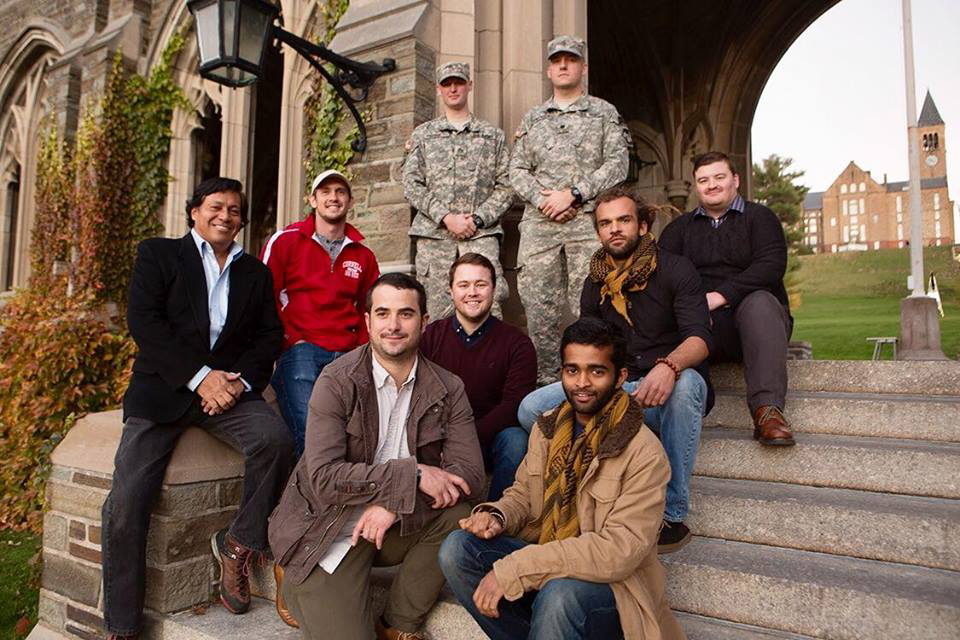Warrior-Scholar Project veterans are Cornell-ready
By Nancy Doolittle

The Warrior-Scholar Project (WSP) helps veterans transition from a military to university environment by providing a highly structured orientation to academic life, with an emphasis on reading, writing and the liberal arts. The project will be offered at Cornell for the third year this summer, July 23-30.
The program, which originated at Yale University in 2012 and is now offered at 13 universities, has already helped the successful transition of two veterans to Cornell: Piragash Swargaloganathan ’19, finishing his first year at Cornell in the College of Human Ecology’s Human Biology, Health and Society Program, and Luke Opyd ’18, studying for his bachelor's in the School of Industrial and Labor Relations and now president of the Cornell Undergraduate Veterans Association (CUVA) and 2017 Cornell coordinator for WSP.
Swargaloganathan is a former U.S. Navy hospital corpsman who served at Walter Reed National Military Medical Center in Bethesda, Maryland. He decided to pursue a medical career after leaving the military. To prepare for that transition, he participated in the 2015 WSP at Syracuse University.
There, he met Cornell graduate Craig Plunges ’04, who suggested that Cornell could be a good fit for him. “Initially I was not even dreaming about applying to an institution such as Cornell,” Swargaloganathan said. “But going to WSP gave me the courage to try.”
Cornell is giving Swargaloganathan a global health context for the work he wants to do in medical school, focusing on the role of science in society. “It has been a really wonderful experience,” he said. The opportunity to study abroad in Cambodia this past winter led him to minor in South Asian studies.
Swargaloganathan said it has been easy for him to connect with “traditional students” – those who attend college right after graduating from high school – but he was surprised by the large science classes. The military taught him to ask for help, so he connected with fellow students, sought out campus resources and reached out by email to his professors when needed, he said.
“Because of my military experiences, I don’t have a stake in social dynamics or expectations,” he said. “That allows me to set my priorities right, spend my time as I should and make sound decisions to reach my goals.”
Opyd enlisted in the Navy in 2008 as an aviation electrician, serving in Japan for four years and then in San Diego, completing his military career as a petty officer second class. He is the recipient of several military medals and awards. While enlisted, he received an associate’s degree in accounting from Connecticut’s Post University.
To prepare for university life, Opyd participated in WSP at the University of Michigan. The program “was a good preview for me,” he said.
Opyd applied to the ILR School because it offered all his favorite subjects: economics, labor relations and law. While visiting Cornell, he met with David Outlaw ’17, then president of CUVA, who assured him he had made the right choice.
Opyd has had one focus at Cornell: work as hard as possible and leave with a degree in hand. But his involvement with CUVA gave him a broader purpose: “CUVA, and now also WSP, lets me help other veterans facing the same transitional challenges I have faced. In both programs, I can help improve the lives of others.”
As program coordinator of WSP at Cornell, Opyd talks with professors, writing coaches and others interested in working with veterans; sets up the week’s schedule of classes and activities; and serves as the first line of communication for this year’s 15 WSP students. “I want to make sure they know what to expect,” he said.
Opyd is also an undergraduate ambassador for Service to School, a national organization that gives consultation to veterans applying to college. Following graduation next year, he plans to attend law school.
Both Opyd and Swargaloganathan have been encouraged by the progress CUVA has made working with senior administrators, by the provost’s recent commitment to increase undergraduate veteran enrollments and by the creation of a veterans advocate position made possible through alumni support. They hope to build on CUVA’s efforts to increase the number of veterans in undergraduate programs, helping dispel some of the stereotypes they encounter and showing that veterans are a diverse group of people, coming from all walks of life and with differing military experiences.
They both agree that the WSP gives veterans a common educational experience with which to start their new careers. “The Warrior-Scholar Project serves as a catalyst for veterans succeeding in higher learning,” said Opyd. “Whether they have considerable academic experience or are starting their first class, veterans at WSP take away a multitude of critical skills and resources that will greatly assist them during their academic journey.”
For more information about the WSP, see the national website.
Media Contact
Get Cornell news delivered right to your inbox.
Subscribe